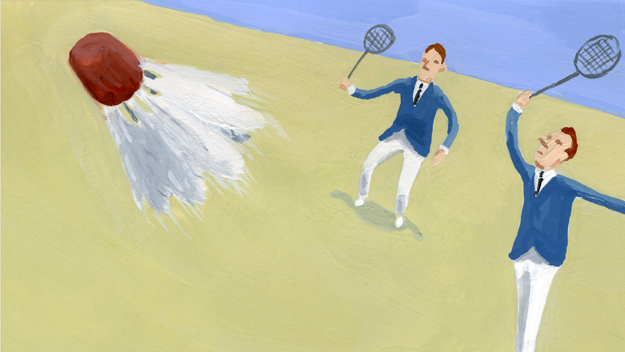By Benjamin Sutton
The 2012 Academy Award-Nominated Live-Action Shorts, Animated Shorts, and Documentary Shorts Opening February 10 at IFC Center
Attempting to find a unifying theme to one year’s 15 Oscar-nominated short films is a necessarily (and happily) impossible task, but if nothing else the strongest contenders in the animated, live-action and documentary short categories all share stories about death and family.
This consistency in subject matter is clearest among the animated nominees, where two kid-oriented American shorts—Wizard of Oz-referencing, reading-promoting The Fantastic Flying Books of Mr. Morris Lessmore and janitorial work-glamorizing Pixar piece La Luna—lose ground to the quirky animation-switching British entry A Morning Stroll and two exceptional Canadian competitors. The beautifully dreary and melancholy Dimanche follows a young boy’s Sunday in his hand-drawn hometown against a backdrop of post-industrial depression and wintry bleakness. Most impressive, though, is Amanda Forbis and Wendy Tilby’s Wild Life, which chronicles the hardships of a newly emigrated young Brit in 1909 Alberta with beautiful painted animation and epistolary narration. Its unique aesthetic lends unmatchable texture to the plains’ golden summers and snow-blanketed winters.
The two stand-out live-action shorts also take place in extreme climates: the icy coast of Norway and the teeming streets of Calcutta. In Norwegian Hallvar Witzø’s surreal and quirky Tuba Atlantic, a man with six days to live wants to settle an age-old beef with his American brother, but to do so needs the coastal winds to carry the notes from his immense waterfront horn across the ocean. Lost family is also, though very differently so, the subject of Raju, Max Zähle’s short about a German couple in India trying to adopt a boy they believe to be an orphan. The righteousness of their endeavor turns ugly when adorable Raju turns out to not be orphaned, but kidnapped. The Irish short Pentecost, a soccer-versus-church comedy about a young boy, ends abruptly and unconvincingly. Likewise silly is Brooklynite Andrew Bowler’s time-travel comedy Time Freak. The British entry The Shore benefits from a terrific performance by star Ciarán Hinds, though its sentimentality seems all too conventional alongside that of Tuba Atlantic, and the superbly edited heartache of Raju.
Of the five nominated short documentaries, two—”where is she now?” Dolores Hart follow-up God Is the Bigger Elvis, and Saving Face, a portrait of a plastic surgeon helping acid-burned Pakistani women—were not available for previewing. But, if James Spione’s phenomenal Incident in New Baghdad doesn’t win, something is very wrong. In it, veteran and anti-war speaker Ethan McCord recounts his experiences in Iraq, including arriving at the scene of the infamous helicopter attack in which American gunners killed two Reuters journalists. The two other contenders, however moving, aren’t as gripping or well-crafted. The Tsunami and the Cherry Blossom by Lucy Walker (nominated last year for her Vik Muniz doc Waste Land) interestingly juxtaposes harrowing accounts of the Japanese tsunami shot on location one month later with a thoughtful examination of the cherry blossom’s symbolic resonances for inhabitants of the devastated region. Though beautiful and hopeful, it goes overlong in its final chapter. Gail Dolgin and Robin Fryday’s The Barber of Birmingham offers a loving portrait of an octogenarian barber and key figure in the Civil Rights movement in Alabama around the time of the 2008 presidential election. It’s a hopeful counterpoint to the disillusionment of Incident in New Baghdad, though it lacks the anti-war short’s arresting force.

